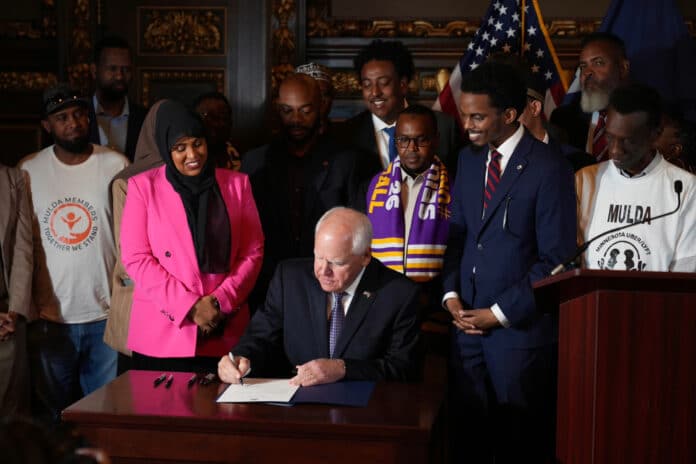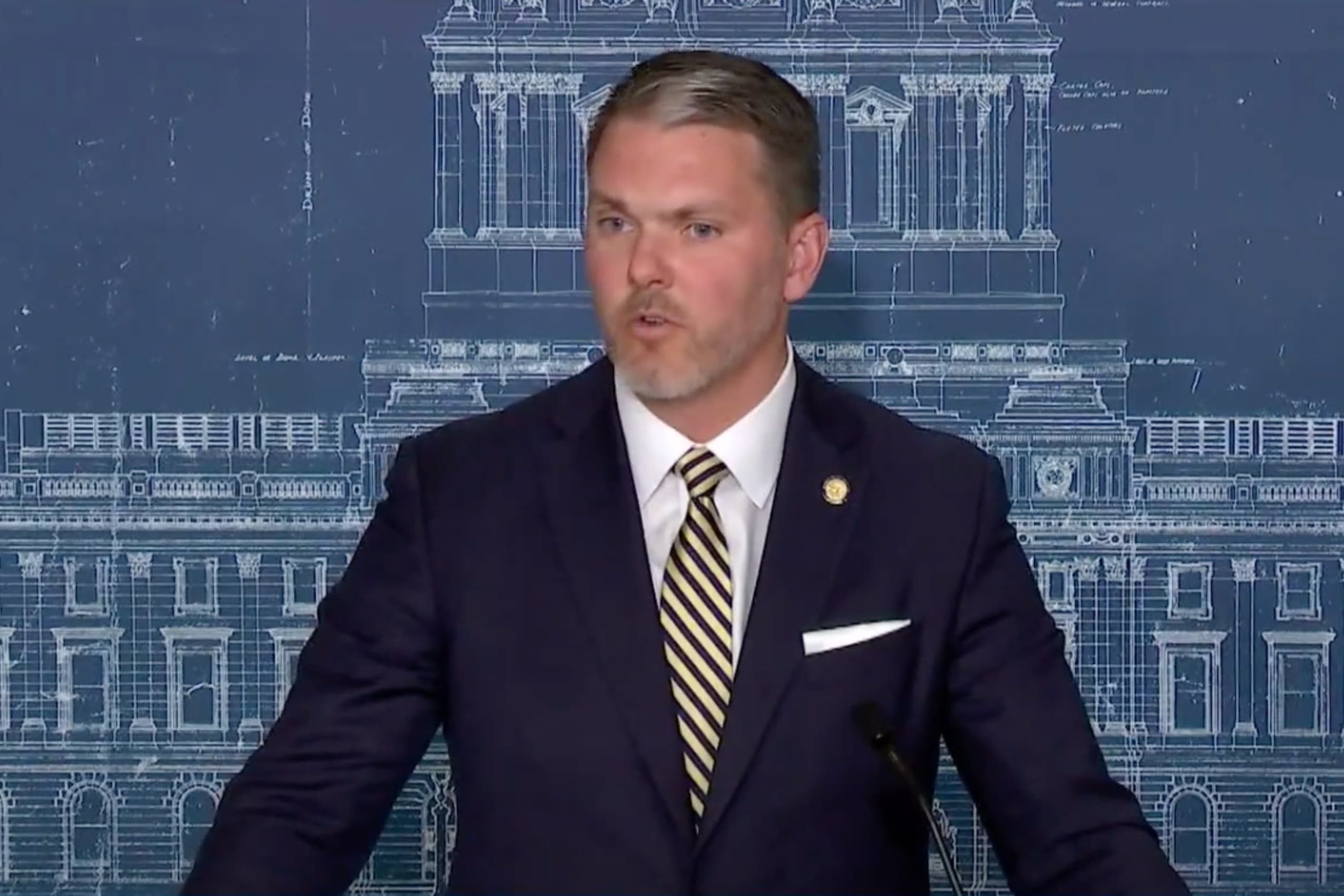
The Minnesota Legislature has a history of pushing constitutional limits on the size and scope of “omnibus bills” that have been signed into law.
Now one of the world’s largest health insurers is suing a state agency to prevent it from enforcing a provision it says would end its Medicaid contracts with the state, which was contained in a 1,400-page “jumbo omnibus” bill the DFL-controlled legislature passed during the final moments of the session this spring.
UnitedHealth Group, the Minnesota-based health insurance titan, filed the complaint Friday, Aug. 2 in state district court. It also names Attorney General Keith Ellison as a defendant. It has tapped Minneapolis-based law firm Faegre Drinker Biddle & Reath to serve as its legal counsel. UnitedHealth Group employs more than 400,000 people across the globe and generates more than $370 billion annually, but its headquarters are based in Minnetonka.
In the complaint UnitedHealth Group Inc. alleges that the legislature’s May 19 passage of HF5247—which constituted dozens of wide-ranging and unrelated provisions across several areas of government policy and expenditures—violates the “Single Subject Clause” of the Minnesota Constitution. Gov. Tim Walz signed the bill on May 24, despite Republican legislators warning the governor it would likely be challenged in court.
On Monday, Senate Minority Leader Mark Johnson said news of the lawsuit was not surprising.
“Republicans warned Gov. Walz this could happen if he signed the monster 1,400-page tax bill rushed through by Democrats in the final minutes of session,” said Johnson, a third-term senator from East Grand Forks and top-ranking Republican at the legislature. “A bill that covers taxes, housing, health care, commerce, higher education, and many other items, is not a single-subject bill, no matter how you interpret the Constitution.”
“Democrats had full control of government and plenty of time to manage a session, but their own internal battles and refusal to compromise made a mockery of the bill-making process. While Democrats promote their accomplishments, it’s a good reminder that to the courts, the end result does not always justify the means.”
‘Jumbo omnibus’ violates Single Subject and Title clauses of Minnesota Constitution
UnitedHealth Group coins the legislation the “jumbo omnibus” and says in the complaint, that among one of bill’s numerous provisions is a new law that, beginning Jan. 1, 2025, will prevent the Department of Human Services from entering into new contracts with for-profit HMOs.
It also alleges the legislation violates the constitution’s Title Clause, which states “no law shall embrace more than one subject, which shall be expressed in its title.” The title of the legislation spans six pages and covers several unrelated areas of government.
In a statement to Alpha News on Monday, a spokesperson for the company described the impetus for the lawsuit by saying that “UnitedHealthcare is challenging legislation that limits choice for individuals, families and children in Minnesota.”
“Minnesotans deserve the right to choose among health plans that offer the broadest access to care, the most innovative services and the highest quality benefits to meet their health care needs,” the company added.
UnitedHealth Group maintains the new law will eliminate choices for recipients of Medicaid in Minnesota, and that the omnibus bill in which the DFL legislators inserted the HMO provision received no open committee hearings before it was passed off the floor in the closing moments of session this spring.
“None of the legislators had time to read it, much less any members of the public or press,” the company maintains in its complaint. “Nor were legislators given time for debate.”
In the complaint the health care insurance company asks the court to order a preliminary injunction to prevent Department of Human Services Commissioner Jodi Harpstead from “enforcing its non-renewal of UnitedHealth’s contracts with the state of Minnesota as an HMO provider on the basis of the unconstitutional HMO provision” of the legislation.
“Buried in the Jumbo Omnibus is a provision that adversely affects Plaintiffs UnitedHealth Group Incorporated … by prohibiting the Commissioner of the Department of Human Services from entering into new contracts with for-profit HMOs. UnitedHealth brings this suit to enforce the democratic protections of the Minnesota Constitution and to have the provision declared unconstitutional under the Single Subject and Title clauses and stricken from law.”
“The Jumbo Omnibus violates the Single Subject and Title Clauses of Section 17” in Article IV of the constitution, the complaint states. “It governs everything from higher education, to traffic cameras, to Uber and Lyft driver compensation, to veterinary licensing, to power plant emissions (to name only a few of the many subjects it addresses),” UHG states in the complaint.
On Monday the plaintiff also filed a claim for a temporary restraining order that would prevent the law from going into effect on Aug. 14 while the claim is being adjudicated. If the court were to dismiss the TRO request, then UnitedHealth’s Medicaid and MinnesotaCare plans will terminate on Jan. 1, 2025, and UnitedHealth would be forced to begin notifying participants of termination in October. It’s expected a judge will rule on the TRO request in a matter of days.
Republicans warned Walz bill was unconstitutional
Gov. Tim Walz signed the 1,400-page omnibus bill on May 24, despite protest from Republican legislative leaders who wrote him a letter asking him to veto the bill and warned him the bill violated the state constitution and risked a lawsuit.
“The title for HF5247 alone is six full pages, including dozens of individual subjects expressed in the title. It is inconsistent with the oath you swore to uphold the Minnesota Constitution to sign this bill into law,” Senate Minority Leader Johnson and House Minority Leader Lisa Demuth said in a letter they wrote to Walz on May 22. “Furthermore, signing this bill would signal to Minnesotans that you explicitly endorse the outrageous and unprecedented breach of process that put the bill on your desk.”

Democratic legislative leaders defended the legislation, saying Republican delay tactics late in the session required them to combine dozens of individual bills into one large, unprecedented omnibus bill.
DFL leadership in the House of Representatives didn’t return a request for comment on Monday.
The UnitedHealth Group complaint cites a 2018 interview in the Rochester Post Bulletin, where Walz, then a candidate for governor, said, “We need an open legislative process that ensures bills aren’t being put together in the final hours of a session … No more going weeks without legislative hearings or cramming everything into large omnibus bills with little or no public input.”
UnitedHealth Group alleges in the complaint that the Minnesota Legislature has “increasingly enacted policy through large omnibus bills of doubtful constitutionality, causing the courts to enforce the Single Subject Clause and warn against future violations.”
History of Single Subject Clause cases in Minnesota
While UnitedHealth Group is seeking relief in the form of asking the court to rule that the HMO provision in HF5427 is unconstitutional, it’s likely that other plaintiffs could file similar claims based on the Single Subject and Title clauses, said James Dickey, an attorney for the Upper Midwest Law Center, which specializes in constitutional litigation and government overreach.
“There are a lot of other policy provisions included in the bill that certainly are not within the Single Subject Clause, in my opinion,” Dickey said. But whether the court may strike down the “jumbo omnibus” bill in its entirety or just the specific provisions that UHG is suing over, depends, Dickey added, citing a 2000 decision where the Minnesota Supreme Court ruled in favor of Associated Builders and Contractors. In that litigation, the organization challenged an omnibus tax relief bill signed into law by then-Gov. Jesse Ventura that it said violated the single subject requirement. In its ruling the majority struck down only the specific provision in the law that the plaintiff cited in its complaint.
In a concurring opinion, Justice Paul Anderson wrote that while he agreed the omnibus bill in question was “unconstitutional under Section 17, I cannot agree with the majority’s conclusion that we can simply strike the offending provision of this law and permit the remainder to continue in effect. The majority’s analysis ignores the constitution’s plain language, confuses the various phases through which a legislative enactment must pass, and ultimately encourages the very mischief Section 17 was designed to prevent.”
That ruling followed prior decisions by the Minnesota Supreme Court—in 1986 and 1989— where it warned the legislature about the constitutional problems with omnibus bills. And in 2018, Democrats at the legislature threatened to sue over the Single Subject Clause on a more than 900-page omnibus bill that a Republican majority passed and then Democratic Gov. Mark Dayton signed into law.
As of June of this year the Minnesota Supreme Court is now composed entirely of justices appointed by DFL governors. Attorney Dickey of the Upper Midwest Law Center says he doesn’t believe the nature of the justices’ appointments “will get in the way of them recognizing this bill violates the constitution.”
“I think they are serious jurists and will see serious problems with this bill, and give this serious consideration regardless of who appointed them,” Dickey said.
Hank Long
Hank Long is a journalism and communications professional whose writing career includes coverage of the Minnesota legislature, city and county governments and the commercial real estate industry. Hank received his undergraduate degree at the University of Minnesota, where he studied journalism, and his law degree at the University of St. Thomas. The Minnesota native lives in the Twin Cities with his wife and four children. His dream is to be around when the Vikings win the Super Bowl.










